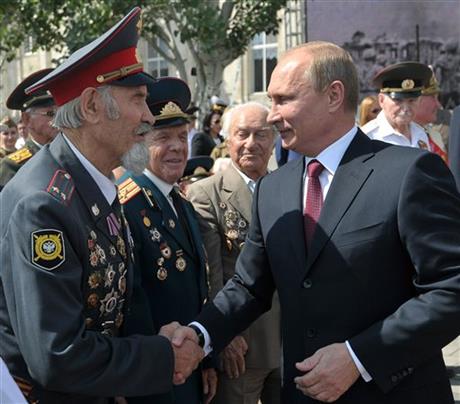
By NATALIYA VASILYEVA
Russian President Vladimir Putin, right, greets World War II veterans before an opening ceremony of newly built fountain called Children Dancing in the southern Russian city of Volgograd, once known as Stalingrad, Friday, Aug. 23, 2013. The fountain is a replica of a fountain which miraculously survived in heavy bombing in Stalingrad in 1942. The original fountain survived until 1951. This year Russia celebrated the 70th anniversary of the end of one of modern warfare’s bloodiest battles (in Stalingrad) that was turning point in World War II and led to the defeat of the Nazi Germany. (AP Photo/RIA-Novosti, Alexei Nikolsky, Presidential Press Service)
MOSCOW (AP) — Russian President Vladimir Putin has signed a decree banning demonstrations and rallies for two and a half months in Sochi around the 2014 Winter Olympics.
The Rossiyskaya Gazeta, the official government newspaper, published the presidential decree Friday, listing an array of measures tightening security in the Olympic host city, including the ban on public assemblies. All “gatherings, rallies, demonstrations, marches and pickets” that are not part of the Olympics or the Paralympics will be prohibited in Sochi from Jan. 7 to March 21, the decree said.
The Winter Olympics is taking place Feb. 7-23 in the Black Sea resort, and the Paralympics are being held March 7-16.
Government-imposed protest bans across entire cities where Olympics are held are unusual. Putin’s decree could be aimed at heading off demonstrations against Russia’s ban on alleged gay propaganda, a new law that has been sharply criticized in the West.
Among other measures in the decree are restrictions on vehicles entering Sochi. Only cars with local license plates, emergency vehicles and those accredited by the Olympic organizers will be allowed to enter the host city between Jan. 7 and March 21.
Rights organizations have voiced concerns about what they described as the “harassment and intimidation of civil society” advocates in Sochi. Human Rights Watch said in a statement that environmental, human rights and other activists have been “the targets of attacks, detention for peaceful protests and police searches.”
The International Olympic Committee received a letter Thursday from Russian Deputy Prime Minister Dmitry Kozak giving assurances that the host country will comply with the Olympic Charter’s provision against discrimination of any kind. The letter, however, defended Russia’s new anti-gay law and said it would be enforced.
International Olympic Committee President Jacques Rogge said Friday that he is “comforted” by Russia’s assurance the charter’s ban on discrimination will be respected.
“We are going to inform now all the national Olympic committees and all the athletes who want to have clarity,” Rogge told reporters after addressing the U.N. General Assembly.
Gay activist Nikolai Alexeyev told The Associated Press on Friday that he would petition the Supreme Court next week to contest the presidential decree banning rallies in Sochi as “violating our right of freedom of assembly.”
Russian authorities have repeatedly denied gay activists’ applications to set up a Pride House in Sochi during the games, but Alexeyev said he would apply for permission to hold a gay pride rally in Sochi on the opening day of the games anyway.


